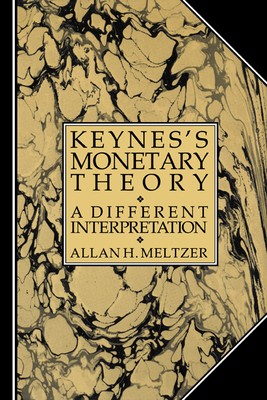
- We will send in 10–14 business days.
- Author: Allan H Meltzer
- Publisher: Cambridge University Press
- Year: 2005
- Pages: 356
- ISBN-10: 0521022754
- ISBN-13: 9780521022750
- Format: 15.2 x 22.9 x 2 cm, softcover
- Language: English
- SAVE -10% with code: EXTRA
Reviews
Description
In this rigorous study of John Maynard Keynes's views on economic theory and policy from 1920-1946, Professor Meltzer argues that some of Keynes's main ideas have been ignored or misstated. While attention has focused on short-term countercyclical policies, the main policy implications have been neglected. Keynes placed great emphasis on rules, predictability, and reduction of uncertainty. In keeping with his theoretical work, he opposed discretionary fiscal changes and favored rules to reduce instability and increase the capital stock. These policies are consistent with, and provide evidence for, the interpretation of Keynes's theory developed here.
EXTRA 10 % discount with code: EXTRA
The promotion ends in 21d.00:16:54
The discount code is valid when purchasing from 10 €. Discounts do not stack.
- Author: Allan H Meltzer
- Publisher: Cambridge University Press
- Year: 2005
- Pages: 356
- ISBN-10: 0521022754
- ISBN-13: 9780521022750
- Format: 15.2 x 22.9 x 2 cm, softcover
- Language: English English
In this rigorous study of John Maynard Keynes's views on economic theory and policy from 1920-1946, Professor Meltzer argues that some of Keynes's main ideas have been ignored or misstated. While attention has focused on short-term countercyclical policies, the main policy implications have been neglected. Keynes placed great emphasis on rules, predictability, and reduction of uncertainty. In keeping with his theoretical work, he opposed discretionary fiscal changes and favored rules to reduce instability and increase the capital stock. These policies are consistent with, and provide evidence for, the interpretation of Keynes's theory developed here.


Reviews